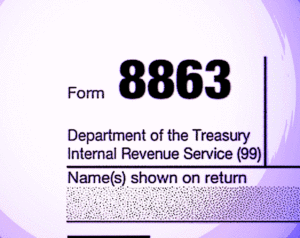Tax Credit for Grad Students
 The students of the Master of Science in Taxation (MST) program at the Foster School of Business volunteer each year with the United Way’s Volunteer Income Tax Assistance (VITA) to help other students file their tax returns. This year, with COVID19, VITA had to be cut short, but we can still blog about saving students money on their taxes.
The students of the Master of Science in Taxation (MST) program at the Foster School of Business volunteer each year with the United Way’s Volunteer Income Tax Assistance (VITA) to help other students file their tax returns. This year, with COVID19, VITA had to be cut short, but we can still blog about saving students money on their taxes.
If you are a graduate student or planning on being one anytime soon, there is an IRS tax credit you should be aware of: The Lifetime Learning Credit (LLC) applies to nearly any type of graduate program and is valid for an unlimited number of years. Undergraduate students have their own tax credit as well, the American Opportunity Tax Credit (AOTC), but today we will focus on the LLC.
Who is eligible for the tax credit?
To be eligible for the LLC, you must be enrolled in an accredited post-secondary educational institution (if unsure see the list at https://ope.ed.gov/dapip).
Only US residents, the taxpayer, taxpayer’s spouse, or taxpayer’s dependent can claim this credit.
What expenses can be used?
Qualified expenses include tuition, required fees or similar expenses. They do not include housing, food, insurance, transportation, and other personal expenses even if they are closely related to your education costs.
Be sure to keep documentation of your eligibility and qualified expenses if the IRS questions your ability to claim the credit–proof of enrollment from the university, receipts, and credit card statements.
You must file Form 8863 along with your tax return in order to claim the credit.
Calculating the LLC Amount
The formula for calculating your credit is to take 20% of your annual tuition and fees, with a maximum amount of $10,000. If you are like most grad students and pay at least $10,000 a year for grad school, your credit would be 20% of that, or $2,000.
If your tuition/fees are lower than that, say only $5,000 for the year, (that would be amazing) your credit would be $1,000.
Saving Money
Claiming the credit on your tax return reduces your tax liability. If, for example, your tax liability based on your income is $2,500, the typical $2,000 LLC would bring it down to only $500, and thus either increase your refund or reduce the amount you owe.
Special thanks for this blog content to MST student Diane Fife and MST instructor Christina Nichols.
For more information on the Lifetime Learning Credit, see the IRS website: https://www.irs.gov/credits-deductions/individuals/llc
Interested in attending the Foster School’s MST program and becoming a Tax Specialist yourself? Check out the MS Taxation degree.
